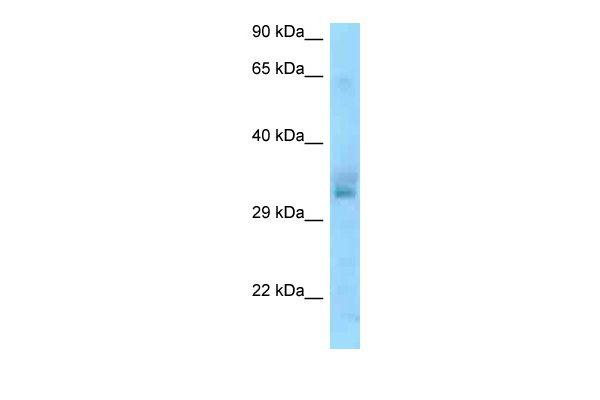UCP1 Rabbit Polyclonal Antibody
Frequently bought together (2)
Transient overexpression lysate of uncoupling protein 1 (mitochondrial, proton carrier) (UCP1), nuclear gene encoding mitochondrial protein
USD 436.00
beta Actin Mouse Monoclonal Antibody, Clone OTI1, Loading Control
USD 200.00
Other products for "UCP1"
Specifications
| Product Data | |
| Applications | WB |
| Reactivities | Human |
| Host | Rabbit |
| Clonality | Polyclonal |
| Specificity | Expected reactivity: Human, Rabbit Homology: Human: 100%; Rabbit: 85% |
| Formulation | Liquid. Purified antibody supplied in 1x PBS buffer with 0.09% (w/v) sodium azide and 2% sucrose. Note that this product is shipped as lyophilized powder to China customers. |
| Concentration | lot specific |
| Purification | Affinity Purified |
| Conjugation | Unconjugated |
| Storage | For short term use, store at 2-8°C up to 1 week. For long term storage, store at -20°C in small aliquots to prevent freeze-thaw cycles. |
| Stability | Shelf life: one year from despatch. |
| Predicted Protein Size | 34kDa |
| Gene Name | uncoupling protein 1 |
| Database Link | |
| Background | Mitochondrial uncoupling proteins (UCP) are members of the family of mitochondrial anion carrier proteins (MACP). UCPs separate oxidative phosphorylation from ATP synthesis with energy dissipated as heat, also referred to as the mitochondrial proton leak. UCPs facilitate the transfer of anions from the inner to the outer mitochondrial membrane and the return transfer of protons from the outer to the inner mitochondrial membrane. They also reduce the mitochondrial membrane potential in mammalian cells. Tissue specificity occurs for the different UCPs and the exact methods of how UCPs transfer H+/OH- are not known. UCPs contain the three homologous protein domains of MACPs. This gene is expressed only in brown adipose tissue, a specialized tissue which functions to produce heat. |
| Synonyms | SLC25A7; thermogenin; UCP |
| Reference Data | |
| Protein Families | Druggable Genome |
| Protein Pathways | Huntington's disease, PPAR signaling pathway |
Documents
| Product Manuals |
| FAQs |
| SDS |
{0} Product Review(s)
0 Product Review(s)
Submit review
Be the first one to submit a review
Product Citations
*Delivery time may vary from web posted schedule. Occasional delays may occur due to unforeseen
complexities in the preparation of your product. International customers may expect an additional 1-2 weeks
in shipping.






























































































































































































































































 Germany
Germany
 Japan
Japan
 United Kingdom
United Kingdom
 China
China



